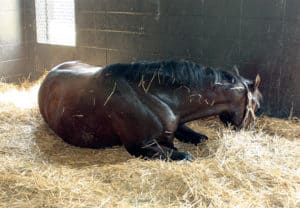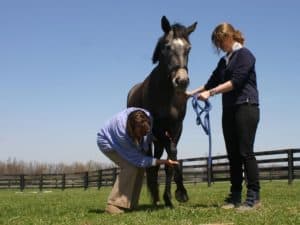Colic in Horses: General Review
Among the species of domestic livestock, the horse is the animal that most commonly suffers from colic. Colic is a general term indicating abdominal pain. The anatomy of the horse’s digestive tract, how the tract works, and the management practices imposed by man seem to contribute to colic’s occurrence. Colic might not be caused solely by diseases of the intestinal tract. In fact, infections elsewhere in the body, as in the urogenital or respiratory tracts, as well as pregnancy might cause the horse to present with clinical signs of colic. A survey in 1986 by the Morris Animal Foundation reported that colic was the leading cause of death in horses and the No. 1 health concern of horse owners.
The amount of money spent on the disease is impossible to totally assess, because not only are there treatment costs, time is also lost are involved. In 1983 the equine insurance industry paid $16 million for claims directly attributable to colic. Therefore, horse owners need to know the causes, clinical signs, diagnostic and treatment procedures and preventive measures to reduce colic’s incidence.
Causes

There are main types of colic, and there are a number of possible causes. Factors such as sudden changes in the weather and feeding (frequency, quantity or quality of feed), and overexertion or chilling may lead to colic. Spasmodic colic is charaterized by severe contractions of the intestines. Intestinal obstruction or a twisted intestine creates a very severe condition resulting in extreme pain. The veterinarian should diagnose the possibility of an obstruction or twisted intestine as early as possible, because such a condition is potentially life-threatening and requires surgery
Create a free account with TheHorse.com to view this content.
TheHorse.com is home to thousands of free articles about horse health care. In order to access some of our exclusive free content, you must be signed into TheHorse.com.
Start your free account today!
Already have an account?
and continue reading.
Written by:
University of Kentucky College of Agriculture, Food and Environment
Related Articles
Stay on top of the most recent Horse Health news with












